LDL Cholesterol and Type 2 Diabetes
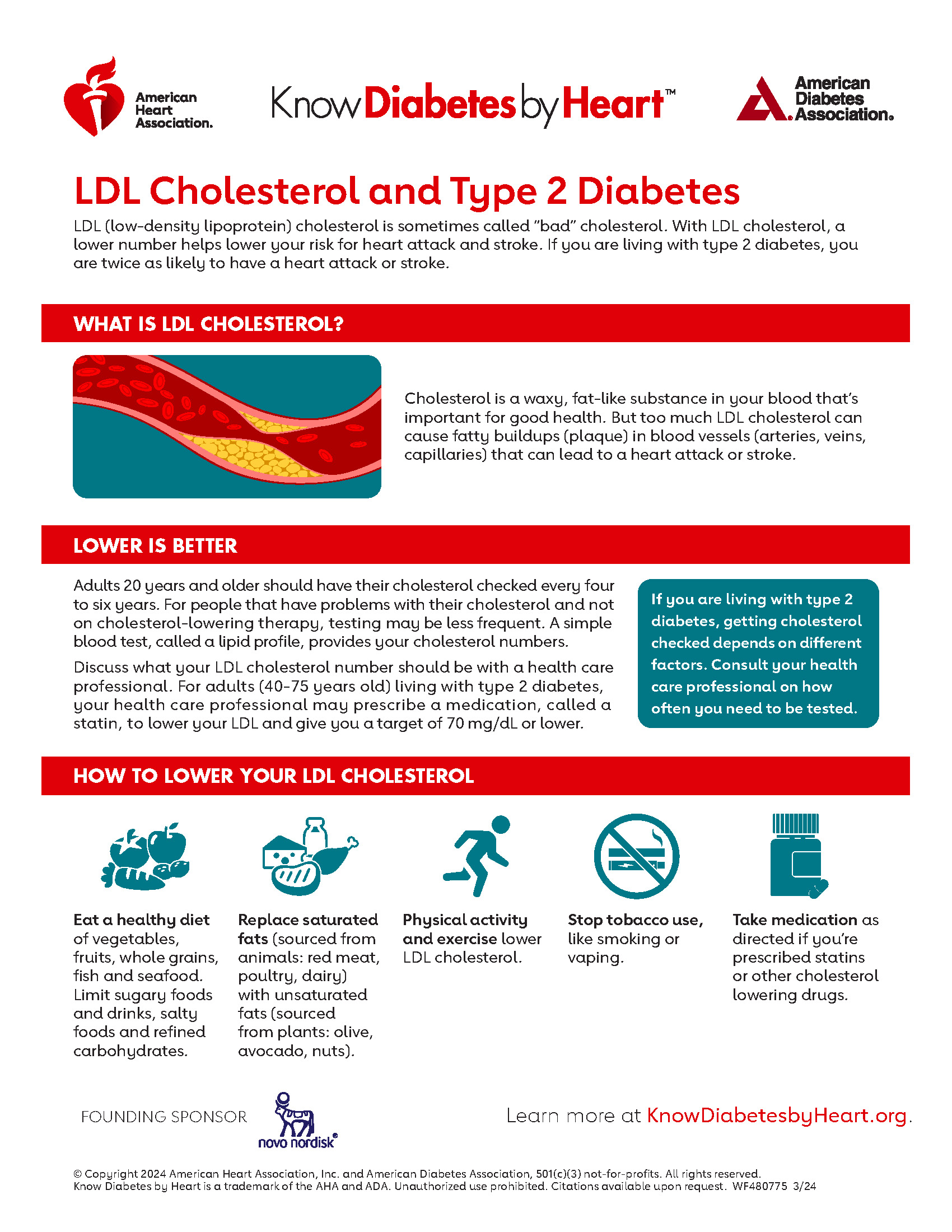
LDL (low-density lipoprotein) cholesterol is sometimes called “bad” cholesterol. With LDL cholesterol, a lower number helps lower your risk for heart attack and stroke. If you are living with type 2 diabetes, you are twice as likely to have a heart attack or stroke.
A1C and Type 2 Diabetes
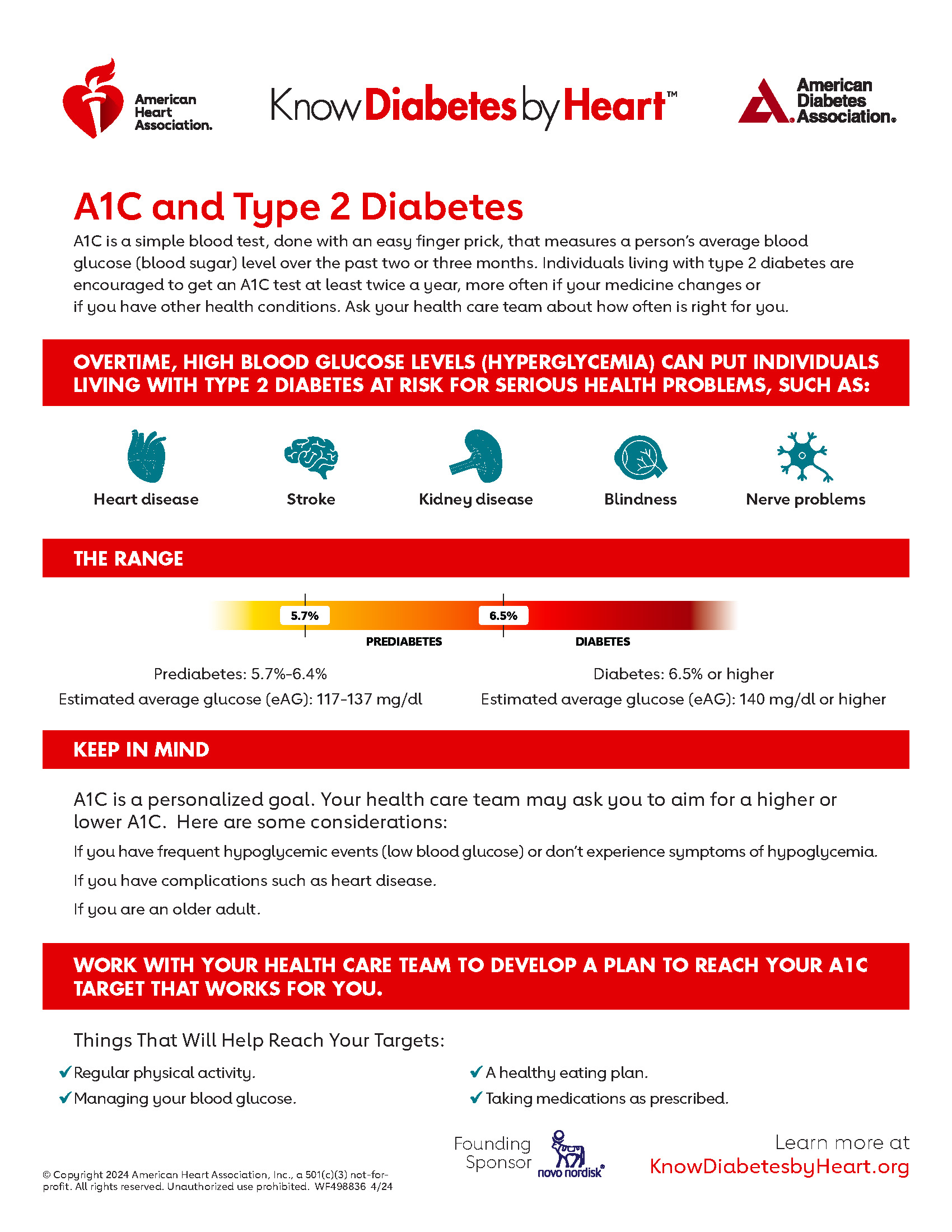
A1C is a simple blood test, done with an easy finger prick, that measures a person’s average blood glucose (blood sugar) level over the past two or three months. Individuals living with type 2 diabetes are encouraged to get an A1C test at least twice a year, more often if your medicine changes or if you have other health conditions. Ask your health care team about how often is right for you.
Available in Other Languages: Haitian-Creole / Vietnamese
The Connection Between High Blood Pressure and Type 2 Diabetes
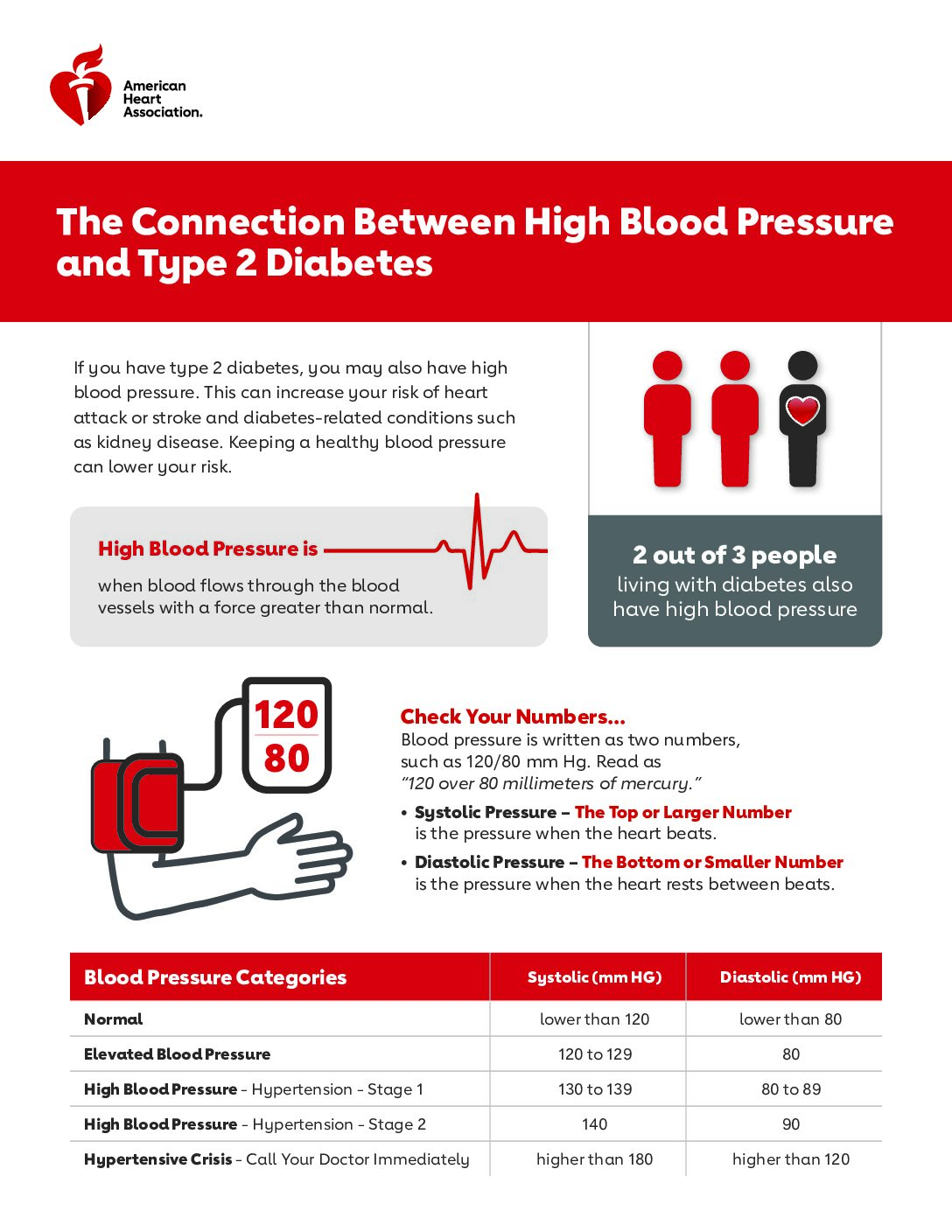
If you have type 2 diabetes, you may also have high blood pressure. This can increase your risk of heart attack or stroke and diabetes-related conditions such as kidney disease. Keeping a healthy blood pressure
can lower your risk.
Available in Other Languages: Haitian-Creole/ Vietnamese
Type 2 Diabetes and Cholesterol
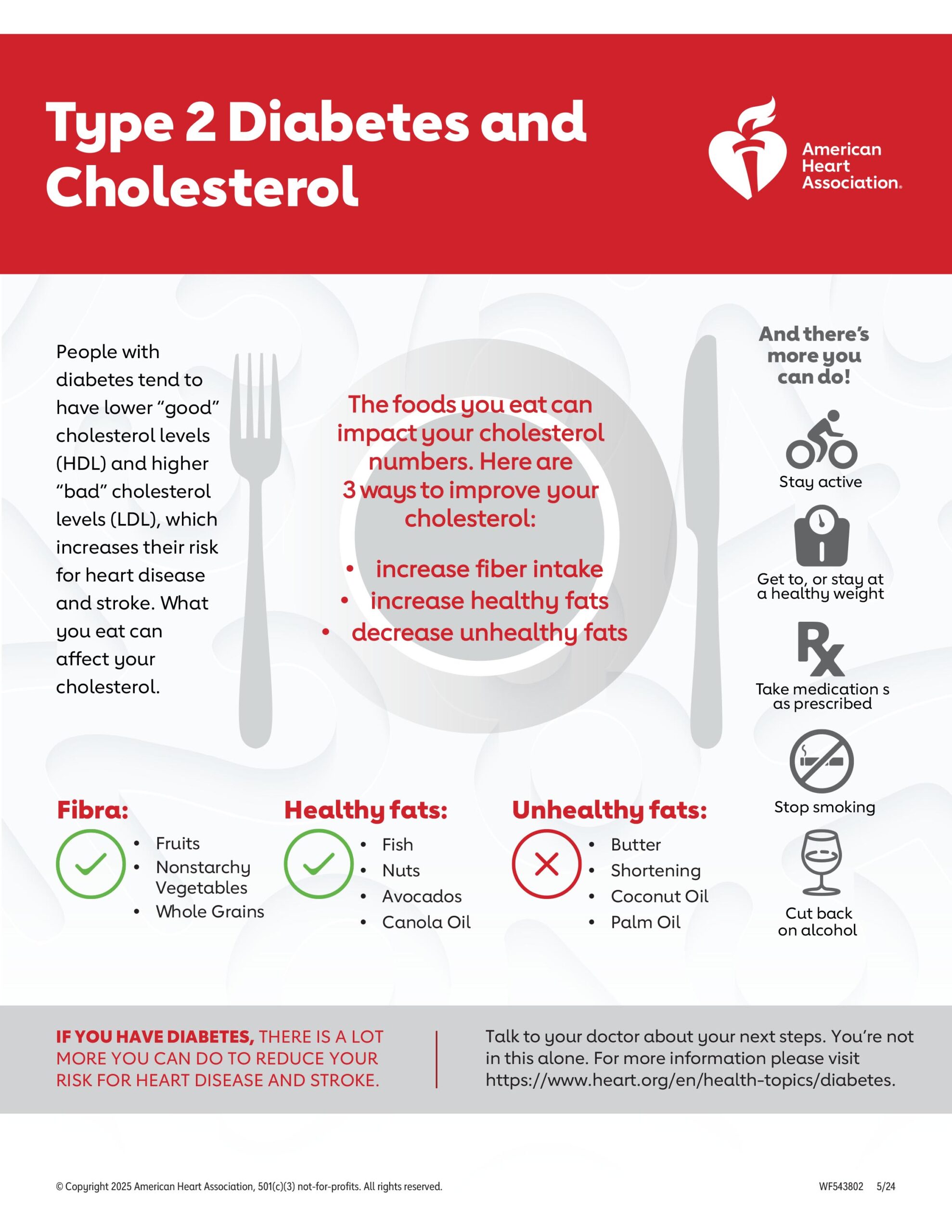
People with diabetes tend to have lower “good” cholesterol levels (HDL) and higher “bad” cholesterol levels (LDL), which increases their risk for heart disease and stroke.What you eat can affect your cholesterol.
Available in Spanish
Body Weight and Type 2 Diabetes
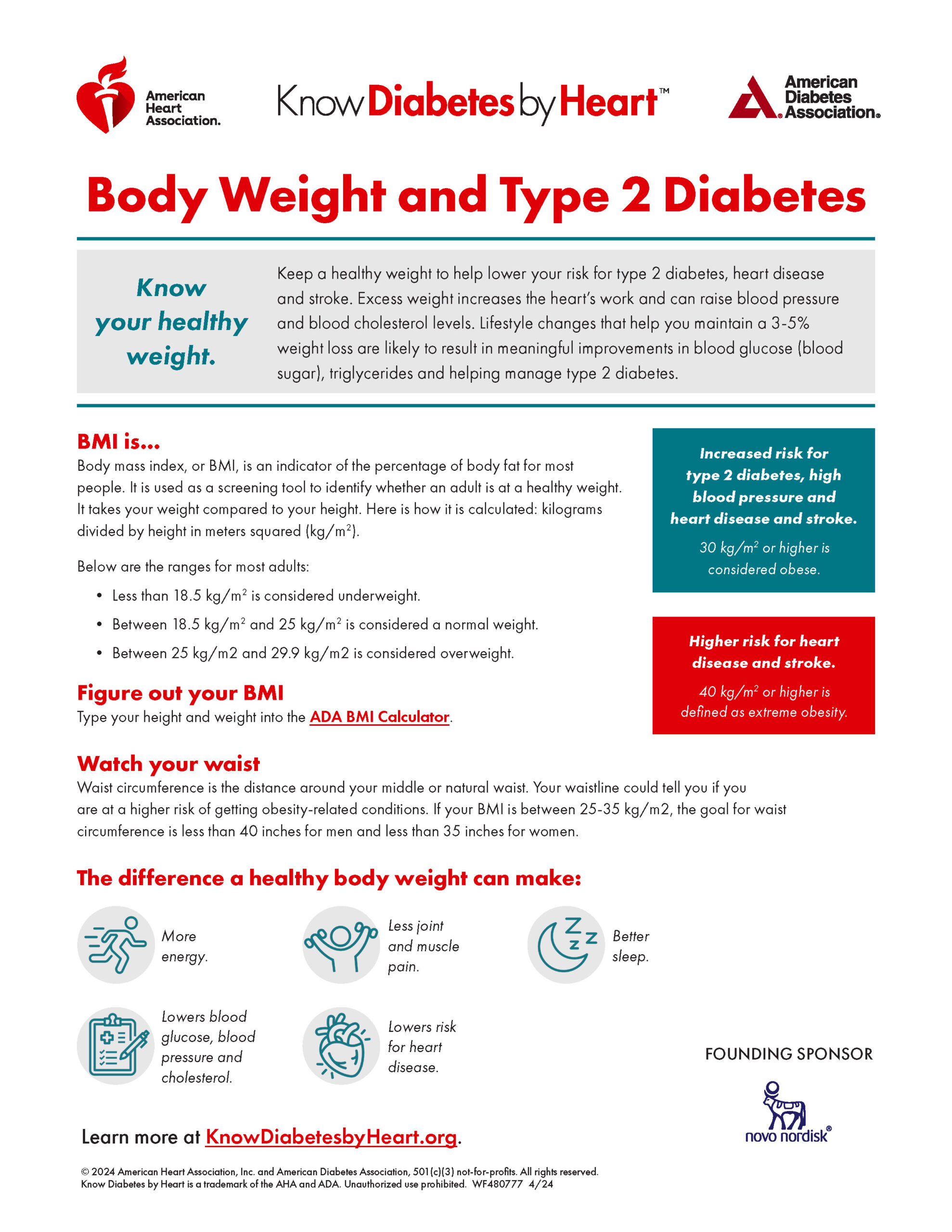
Keep a healthy body weight to help lower your risk for type 2 diabetes, heart disease and stroke.
Trouble Sleeping at Night? Lack of Sleep Can Impact Your Health
Tuesday, October 10, 2023
Watch the Video
Healthy Eating when Juggling More Than Diabetes
Tuesday, September 12, 2023
Watch the Video
Lifestyle Choices Matter. How to Quit Bad Habits
Tuesday, August 8, 2023
Watch the Video
Here are a few notable questions asked during this event:
- “I feel overwhelmed by all the changes I need to make to my diet. Where do you recommend that I start?”
- “What are the three most important lifestyle choices that can lower the risk of developing heart disease and stroke?”
- “How do you see lifestyle medicine making changes in healthcare or being incorporated over the next decade?”
- “Do you have any tips to get off of sugar?”
Just Do It! Being Active May Be the Most Important Contribution to Your Health
Tuesday, June 13, 2023
Watch the Video
Learn about the importance of blood glucose (blood sugar) management in all activity levels from desk exercises to high-intensity sports.
Sleep is Essential to Overall Health
A good night’s sleep can make a dramatic difference in your day. After a poor night’s rest, we may feel unfocused and even notice a change in our eating habits and cravings. However, there is more under the surface of a poor night’s sleep. Poor sleep quality is associated with an increased risk of obesity, high blood pressure and cholesterol disorders, depression, cardiovascular disease, cognitive decline, and a higher A1C in people with type 2 diabetes. In fact, insufficient sleep can lead to insulin resistance and high blood glucose (blood sugar). Sleep is recognized as imperative to lessen the risk of chronic diseases such as diabetes and heart disease so much so that the American Heart Association now includes sleep in its Life’s Essential 8.
Benefits of Sleep
The Centers for Disease Control (CDC) reports that a third of adults do not get enough sleep. Adults should get at least seven to nine hours of sleep daily and children require more. Quality sleep can restore health, strength, and a feeling of well-being. Benefits of sleep both directly and indirectly work toward reducing the risk of heart disease. When our body gets the rest it needs, it repairs cells, tissues, and blood vessels. This allows for a stronger immune system and better mental function. Researchers who conducted studies on people with type 1 diabetes and sleep found that increased sleep improved glucose control, decreased symptoms of anxiety and depression, and improved cognitive tasks.
So, what can you do to improve your sleep quality?
- Be consistent in your sleep/wake pattern by setting a daily alarm. Using weekends to catch up on extra sleep may just derail the quality of sleep you achieve.
- Try to have blood glucose in a healthy range before bedtime. Symptoms of high and low blood glucose can hinder your ability to fall asleep or possibly wake you from sleep. Things to consider before bedtime would be the need for any medications such as insulin for high blood glucose, or a small bedtime snack to prevent low blood glucose.
- Not only does physical activity tire your body out, but it also improves circulation and helps relieve stress. It is important to discuss with your health care team to find the balance that works best for you. Aim for 150 minutes of physical activity or exercise each week.
- Be mindful of what you eat and drink. Avoid stimulants like coffee or other caffeinated beverages and foods late in the day. While alcohol acts as a sedative in our body, once metabolized it may disrupt your sleep.
- When possible, keep other devices like your smart phone and tablet away from your bed. In the hours before bedtime, change your device settings to dim or use the device’s light filtering mode. Blue light from devices can alter our circadian rhythm and melatonin production.
- Create an environment for rest. A cool temperature and dark room are a great start. If your thoughts are keeping you awake, try meditation, prayer, or deep breathing to clear your head. This may also lower the stress you may feel.
When it’s Time to See a Specialist
It may come as no surprise that optimal sleep habits make you feel better day to day. If you have tried to improve your sleep patterns and are still waking up all night or if you have trouble waking up in the morning or being alert during the day, it may be time to see a sleep specialist. Talk to your health care team about sleep challenges. You may have a medical condition, such as sleep apnea, or need help improving your sleep habits. Persons with diabetes are already at a higher risk of heart disease, stroke, and kidney disease. A good night’s rest will help in many aspects of overall self-care and disease management. In any case, by prioritizing quality sleep, you can make a meaningful impact on your health and well-being.
https://www.heart.org/en/healthy-living/healthy-lifestyle/sleep
https://diabetes.org/diabetes/treatment-care/high-morning-blood-glucose




